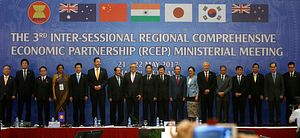Over the past few years, one of the few bright spots in trade that has been in the spotlight is the Regional Comprehensive Economic Partnership (RCEP). While the initiative continues to receive a lot of headlines, obstacles remain to it becoming a reality.
While RCEP itself largely represents an effort to harmonize existing deals between the 10 members of the Association of South East Asian Nations (ASEAN) with Japan, China, India, South Korea, Australia and New Zealand, it is not without significance. The sixteen Asia-Pacific countries constitute about a third of the world’s total global gross domestic product. And if it succeeds, RCEP will open a market that accounts for 3.4 billion people.
But the fiscal and cultural differences between them are enormous, which partly accounts for why some gaps are hard to bridge. Australia remains the richest country, with a nominal GDP per capita of more than $55,000, while Cambodia is the poorest, with just $1,300 for each person.
India is often seen as being one of the countries which has been facing challenges in realizing RCEP. Among the main concerns for India is over electronic data sharing and demands for local data storage requirements. It wants member countries to retain their rights to protect digital data generated from home for security reasons, the national interest, and to ensure confidentiality. Observers say those requirements would enable governments to direct companies to base their computing facilities in-country and thus control the cross-border flow of data.
But while India has struggled to meet RCEP demands while appeasing politicians trade unions, civil society and indigenous groups at home, it is also far from the only one. Opposition to dairy imports does not sit well with Australia and New Zealand, to take just one example. Other issues include access to generic medicine, ensuring mining profits remain in-country, and opposition to privatization in key sectors like water, energy, transport, and telecoms while wealth gaps and fears that too many people will be left behind remain prominent concerns.
As of now, it appears that RCEP countries are still trying to narrow their differences despite the challenges that remain. A series of scheduled meetings ended in Bangkok over the weekend, where an agreement was struck on the free movement of people within RCEP but finding a resolution on issues ranging from dairy products to e-commerce and foreign investment remained elusive.
All in all, negotiators have agreed on 14 of the 20 chapters to be negotiated, with another two believed to be close at hand. Negotiators are hopeful that all can be resolved soon, with progress expected in subsequent meetings in the weeks that follow. Thailand’s commerce minister, Jurin Laksanawisit, said he remained optimistic that the remaining six chapters still in dispute would be resolved before the self-imposed deadline of the next ASEAN Summit in early November.
Nonetheless, in an overall sense, progress on RCEP has been disappointing given the years of negotiations that have already passed as well as he growing urgency to finalize a deal amid rising protectionism and the trade war between the United State and China. And while there are certainly pathways available to resolve issues, be it incorporating temporary mechanisms to protect aspects of local industry or even agreeing on a smaller, interim deal, these will cut against the promise that RCEP had offered in the first place. As we see and hear more meetings on RCEP occur in the coming weeks and months, those realities will be important to keep in mind.
































